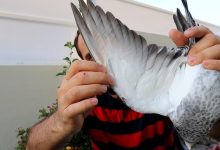Raising pigeons, commonly known as “homing pigeons” or “doves,” is a practice that has been carried out for centuries, blending both practical utility and recreational enjoyment. These birds, renowned for their intelligence and strong navigational abilities, have historically been used for communication, sport, and as pets. This article delves into the multifaceted aspects of pigeon-keeping, encompassing the essentials of housing, feeding, health management, breeding, and training, all crucial to maintaining a thriving and harmonious flock.
Housing and Shelter
The foundation of successful pigeon keeping begins with proper housing. Pigeons require a safe, clean, and comfortable environment to thrive. Traditionally, pigeon lofts or coops have been used for this purpose, which should be spacious enough to accommodate the birds comfortably. A well-designed loft not only provides shelter but also facilitates proper ventilation, which is vital for preventing respiratory diseases.
Lofts should be elevated off the ground to avoid dampness and predators. The interior should be equipped with perches, nesting boxes, and ample space for the pigeons to move around. The dimensions of the loft depend on the number of pigeons; however, a general rule is to provide at least 1 square foot of space per pigeon. Proper ventilation is crucial to ensure a steady flow of fresh air, as stale air can lead to respiratory problems.
Feeding and Nutrition
Pigeons have specific dietary needs to ensure their health and productivity. Their diet should be varied and balanced, primarily consisting of grains. A typical diet includes a mixture of corn, wheat, barley, and peas. Additionally, pigeons benefit from the inclusion of small quantities of legumes, seeds, and greens to provide essential vitamins and minerals.
Supplemental feeding is also important, particularly in terms of providing grit and calcium. Grit helps in the digestion of seeds and grains, while calcium supports bone health and egg production in breeding pigeons. Commercial pigeon feeds often come fortified with these essential nutrients, but it is also beneficial to provide access to fresh water at all times.
Health and Hygiene
Maintaining the health of pigeons requires diligent attention to their living conditions and regular health checks. Cleanliness is paramount in preventing diseases; thus, regular cleaning of the loft and replacement of bedding is necessary. Pigeons are prone to various ailments, including respiratory infections, parasites, and nutritional deficiencies.
Routine health checks should include monitoring for signs of illness such as changes in droppings, reduced activity levels, or abnormal feather conditions. Preventative measures include regular vaccination and deworming as recommended by avian veterinarians. Establishing a relationship with a vet experienced in avian medicine can be invaluable in managing pigeon health.
Breeding and Raising Young
Breeding pigeons can be a rewarding aspect of pigeon-keeping, offering the opportunity to increase flock size and improve genetic lines. Pigeons are monogamous, typically forming lifelong pair bonds. Successful breeding involves ensuring that both the male and female pigeons are in good health and have adequate space and resources.
Nesting boxes should be provided for breeding pairs, and the environment should be quiet and secure to encourage successful nesting. Pigeons generally lay two eggs per clutch, which both parents take turns incubating. The eggs hatch after about 18 days, and the parents feed the squabs (young pigeons) a special substance known as “pigeon milk,” a nutrient-rich secretion from the crop.
Post-hatching care involves monitoring the growth of the squabs and ensuring they receive proper nutrition. After about 4 to 6 weeks, the young pigeons are ready to leave the nest and begin learning to fly and forage. Proper care during this fledgling stage is essential to ensure they adapt well to their environment.
Training and Exercise
Training pigeons, especially homing pigeons, requires patience and consistency. Homing pigeons are renowned for their ability to return to their home loft from long distances, a trait that has been harnessed in various pigeon sports and communication methods.
Training typically starts with acclimating the pigeons to their loft and gradually increasing the distance of their training flights. It is crucial to start with short distances and progressively lengthen them to build the pigeons’ endurance and navigation skills. Regular exercise is essential for maintaining the pigeons’ physical fitness and enhancing their homing abilities.
In addition to training for homing, pigeons can be trained for competitive racing, which is a popular sport involving timed flights over varying distances. Successful racing pigeons are often the result of a combination of genetic factors, training, and care.
Pigeon-keeping as a Hobby and Sport
Pigeon-keeping is not only a practical endeavor but also a cherished hobby and competitive sport for many enthusiasts. The sport of pigeon racing, in particular, has a rich history and a dedicated following. Enthusiasts invest significant time and resources into breeding, training, and caring for their pigeons to achieve success in races.
In addition to racing, pigeon-keeping can also involve the maintenance of ornamental pigeon breeds, which are valued for their unique appearances and behaviors. These breeds may not be as practical as homing pigeons but are appreciated for their beauty and the enjoyment they bring to their keepers.
Challenges and Considerations
While pigeon-keeping offers many rewards, it also comes with challenges. Managing a flock requires a significant commitment of time, effort, and resources. Issues such as disease outbreaks, predator attacks, and changing environmental conditions can pose challenges that require proactive management and problem-solving.
Legal and ethical considerations are also important, as some regions have regulations regarding the keeping of pigeons. It is essential for pigeon keepers to be aware of local laws and to adhere to them to ensure that their practices are in compliance.
In summary, raising pigeons involves a blend of dedication, knowledge, and skill. From providing proper housing and nutrition to managing health and training, each aspect of pigeon-keeping contributes to the overall well-being and productivity of the flock. Whether pursued as a hobby, a sport, or a practical endeavor, pigeon-keeping offers a unique and fulfilling experience for those who are passionate about these remarkable birds.




